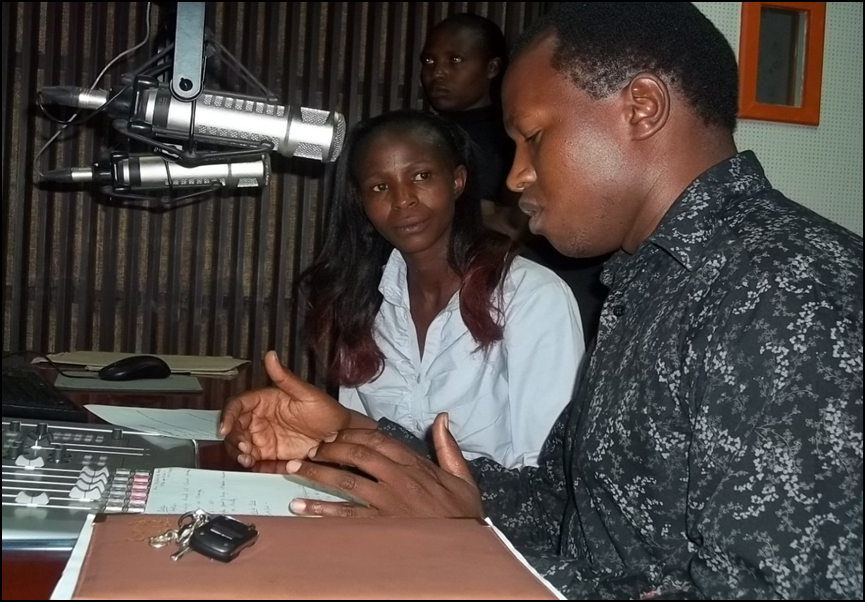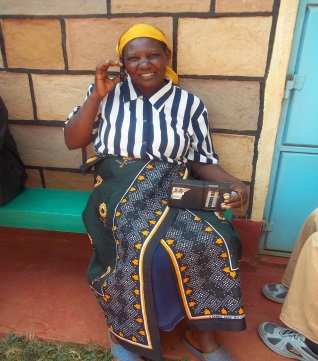The Africa Climate Exchange (AfClix) is working in Africa, creating opportunities for dialogue and collaboration between climate scientists, decision-makers and local communities. We encourage the sharing of understanding, and the exchange of knowledge, in order to use recent developments in our climate science to inform policy decisions and directly affect practice.
Humanising our research is important to us. AfClix is interested in real people, their lives and livelihoods and the difference that research can make. It drives every step we take. To do this, we are pioneering an integrated approach to climate information systems – we are connecting up with applications on the ground and combining them with participatory knowledge sharing activities that cut to the core of decision-making (Figure 1) and challenge traditional approaches. Such interdisciplinary working and stakeholder engagement enhances our research and keeps us focused on the sharp end.
Figure 1. Playing serious games to explore early warning needs with Burkinabe government ministers, local humanitarian and development practitioners, community leaders, and local media
We know that this approach is helping us to make a positive difference to the lives of 800 million people in Sub-Saharan Africa, by reducing vulnerability and increasing the resilience of their societies to climate variability and change.
Working Together
Conversation and collaboration through AfClix-driven exchanges are leading to new networks which utilise existing knowledge and result in the commissioning of new research directly related to the need on the ground. This helps to ensure a continual pull-through of research into policy and practice. This engagement also means that new information can be fed back to help shape the research process, increasing its impact on the ground now and in the future.
One such example is BRAVE: Building understanding of climate variability into the planning of groundwater supplies from low storage aquifers in Africa.
Increasing water demands in Burkina Faso and Ghana are set in a context of a highly variable climate and changing land, together with a dependence on access to groundwater from low-storage, low-yield aquifers.
The approach The BRAVE project will use the River Volta Basin (RVB) in West Africa as a case study area, to examine planning needs and support decisions on groundwater development for some of the poorest communities in Burkina Faso and Ghana. For this large-scale complex interdisciplinary project, we have brought together a strong team of internationally-recognised meteorologists, hydrogeologists, land surface modellers and knowledge exchange experts, with extensive experience of working in Africa. Working together with the British Geological Survey, the national governments in Burkina Faso and Ghana, Christian Aid Sahel, CARE International and Water Aid (amongst others), and a wide range of stakeholder networks on the ground, we are using our research to examine planning needs and support decisions on groundwater development for some of the poorest communities in the Sahel.
To do this we are applying linked land surface and groundwater models to assess the impact on groundwater supplies of periods of reduced recharge, and the sensitivity of groundwater recharge to key climate and land use controls. Combining new scientific knowledge with outputs from this suite of linked models, we will be able to identify which are the regions where groundwater development needs to incorporate measures to address impacts of extended periods of low recharge. These tools will be combined with national mapping of areas at risk with monitoring of current status of resources to provide local-level advice on sustainable groundwater development. The production of seasonal groundwater status reports will be linked into the newly operational RWX (Rainwatch-AfClix) Drought Early Warning System in Burkina Faso and Ghana, and the Farm Africa radio platform with our BRAVE partners, the Lorna Young Foundation.
Figure 2. BRAVE partners, the Lorna Young Foundation, will be extending their successful radio platform in DRC and Kenya to support the BRAVE project. Working with Burkinabe and Ghanaian communities we will help them manage their water resources through radio training, SMS, farmer field listening groups and multi-stakeholder platforms.



